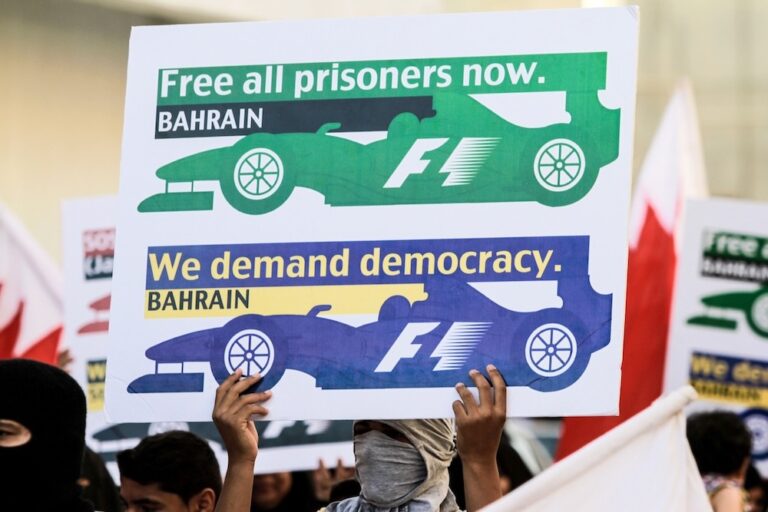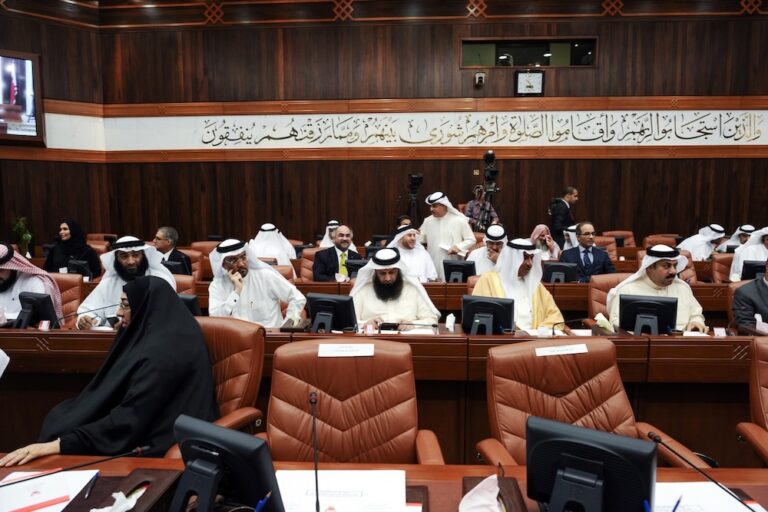(BCHR/IFEX) – A high Bahraini security officer at the Ministry of Interior (MoI) informed the National Democratic Action Society “Waad”, a political society, that the authorities would not approve a public seminar scheduled for 22 April 2009, at the society’s premises, in the capital of Manama. If “Waad” wished to hold the event, the MoI […]
(BCHR/IFEX) – A high Bahraini security officer at the Ministry of Interior (MoI) informed the National Democratic Action Society “Waad”, a political society, that the authorities would not approve a public seminar scheduled for 22 April 2009, at the society’s premises, in the capital of Manama. If “Waad” wished to hold the event, the MoI officer said, they should apply for permission from the Ministry of Interior three days before the seminar. Mr. Ibrahim Sharif, Secretary General of “Waad”, refused to do this. Sharif was supposed to be the moderator of the seminar focusing on the latest release of prisoners and the proposed dialogue with the authorities. Many political figures in Bahrain were expected to have participated in the event.
By the early evening on 22 April and before any members of the public had arrived at the society’s premises, Security Special Forces (SSF) cordoned off the area near the “Waad” building, blocking all roads leading to it and preventing people from coming closer to the venue where the seminar was going to be held. The organisers of the event told BCHR that these threats and the ban were imposed one day before the seminar was to take place, even though this is a weekly event that “Waad” has been hosting since 2002. Sharif stated: “If we (are required to) apply for permission for a public seminar, as if doing so was against the law, then not only will we set a new norm that we are not in favour of, but moreover, this means that the 350 public seminars that we held in the past were illegal, and that is not comprehensible”.
The “Waad” secretary general added: “I told the authorities that we, and other societies, have been carrying out seminars on a regular basis and we have never, nor have others, needed to seek permission for a public seminar”.
In a similar vein, the BCHR learned that the organisers of another public seminar which was to be held on 23 April in a Shia Community Center on Nabih Saleh Island, were approached by the MoI and were threatened with the use of force if the seminar was carried out on those premises. Those scheduled to participate in the seminar included the recently released from prison Mr Mohammed Habib Al-Muqdad, a scholar and social activist, Mr Abdulwahab Husain, a well known political activist, and Dr Abduljalil Alsingace, activist and human rights defender. At the last minute, the organisers swiftly changed the venue of the seminar to a nearby location.
The authorities are using the Bahraini Gatherings Law of 2006 to justify their intervention and ban numerous public sit-ins, demonstrations and seminars, even when these are not held outdoors. This is not the first time that this approach is being used to prevent a public seminar from being held. BCHR recalls the use of tear gas, rubber bullets and plastic batons by the SSF to disperse and injure people heading to a seminar which was not approved by the authorities. Similarly, the SSF recently prevented political and cultural events from taking events in Sitra. Large numbers of troops were deployed to set siege to Al-Atar (a Shia Cultural Center) to prevent a similar event from taking place and to threaten its hosts.
The BCHR expresses its concern about the deterioration in freedoms and the use of force to prevent society leaders and members, politicians and human rights defenders from expressing their views. The Bahraini Gathering Code has been condemned locally as well as internationally by renowned organisations due to its gross restrictions on all forms of assembly and freedom of expression. Restricting freedom of expression is a flagrant breach of Article 19 of the International Covenant on Civil and Political rights, which Bahrain signed in September 2006.
The BCHR urges the Bahrain authorities:
– to respect freedom of assembly, opinion and expression in accordance with international standards;
– to refrain from using, or threatening to use, force in the suppression of freedom of expression and peaceful gatherings;
– to uphold Bahrain’s vows and promises made during the periodical review by the Human Rights Council, taking into consideration respect for human rights and values.


